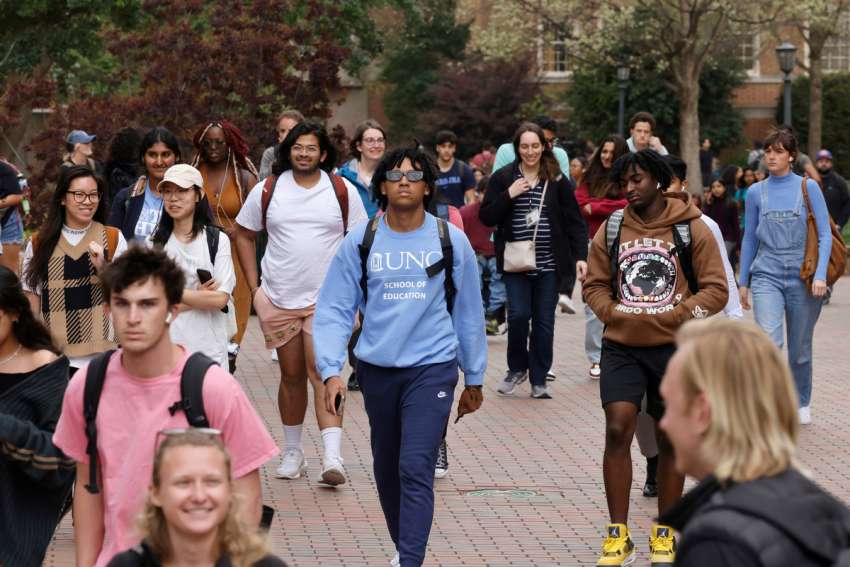"We're used to seeing these events on the news. Obviously, when it happens in your own backyard, it affects you," said Father Scott McCue, pastor of the Catholic Community of St. Thomas More in Chapel Hill, North Carolina.
On Aug. 28, the University of North Carolina at Chapel Hill was placed on lockdown as reports emerged just after 1 p.m. (local time) of an active shooter on campus. Some 90 minutes later, suspect Tailei Qi, a doctoral student, was arrested for the shooting death of Zijie Yan, Qi's advisor and an associate professor in the school's department of applied physical sciences.
Qi has been charged with first-degree murder and possession of a gun on a school campus. The motive for the killing remains unclear.
The shooting occurred within a mile and a half of St. Thomas, but Father McCue said his staff, students and school parents promptly followed shelter-in-place protocols, which were in effect "for about three hours" until local authorities issued an all-clear.
Also under lockdown was the Newman Catholic Community on the UNC campus, located about half a mile from the school's Caudill Labs, where Yan was slain.
Students and staff at the Newman Catholic Community calmly sheltered in place, pastor and campus minister Franciscan Father Timothy Kulbicki said.
"The students prayed a rosary," he said, noting that "there were no extreme reactions" to the event.
With UNC classes canceled Aug. 29, Father Kulbicki organized a "wellness day" for the Newman Community that along with Mass and the rosary included a meal, games, painting, and a sharing session he and a social worker facilitated.
During the crisis, both St. Thomas and the Newman Catholic Community relied upon well-rehearsed emergency responses.
"We prepare for events like this," said Father McCue, who was away from the parish at the time but in communication with staff. "We have an advanced safety and security team that has helped other parishes in the diocese."
That team, known as the St. Michael the Defender Ministry, is led by Jeff Malkovsky, a professional in the field of global complex risk and threat management.
Malkovsky said the ministry -- launched in 2017, and now working with other parishes in the Diocese of Raleigh -- begins with a "risk site assessment" that "determines where the vulnerabilities are and what potential threats are, then develops a unique, customized response."
"Every parish is different," said Malkovksy, who also advises the Newman Catholic Community at UNC. "A rural parish of 500 is going to be different than an urban parish with 10,000 parishioners."
At St. Thomas, weekend Masses are staffed by an armed off-duty Chapel Hill police officer, said Father McCue.
In addition, "every year in March we have a 'Safety Sunday,'" with parishioners "practicing evacuation drills if there is an (emergency) event," he said.
"We take them out the side entrances, which people aren't used to going out of," said Father McCue, adding those drills enhance the crucial "muscle memory" needed for reacting swiftly to a crisis.
The parish also has medical kits and automatic external defibrillators on hand, he said.
"We practice a great deal for emergency medical responses, since the probability is very high," said Malkovsky, recommending that parishes "get CPR training and first-aid training, and put a team together to practice."
Identifying and proactively responding to mental health issues is also essential, said Marianne Mitchell, a licensed educational psychologist and chair of the mental health ministry at St. Thomas.
The ministry, which works in tandem with the St. Michael ministry at Masses, seeks to "train as many people as possible in mental health first aid," Mitchell said.
The mental health first-aid model -- created in 2001 by health education nurse Betty Kitchener and mental health literacy professor Anthony Jorm -- offers training in identifying, understanding and responding to mental illness and substance abuse. Along with those courses, Mitchell and her team also draw on the Sanctuary Course for Catholics, a version of the ecumenically based Sanctuary resource for destigmatizing and addressing mental illness in faith communities.
Mitchell pointed to the inspiration found in a number of Catholic saints who during their earthly lives struggled with some form of mental or emotional illness, among them "St. Dymphna, St. Benedict Labre, St. John of God, Mother Teresa and St. Therese (of Lisieux)."
She and Malkovsky are "in dialogue" during Sunday Masses, with each team's members wearing name tags for their respective ministries so that they can be easily identified as resources for help.
"Should there be an emergency, we check in with the St. Michael ministry members on duty," she said.
Faith isn't at odds with practical preparation for security and mental health emergencies, said Malkovsky.
"We're just trusting in God and doing the best we can as people to look after our parish family and those people with whom we come in contact every day," he said.

